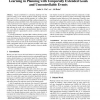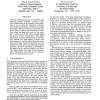17 search results - page 1 / 4 » Planning with First-Order Temporally Extended Goals using He... |
AAAI
2006
13 years 6 months ago
2006
Temporally extended goals (TEGs) refer to properties that must hold over intermediate and/or final states of a plan. The problem of planning with TEGs is of renewed interest becau...
AIPS
2006
13 years 6 months ago
2006
Temporally extended goals (TEGs) refer to properties that must hold over intermediate and/or final states of a plan. Current planners for TEGs prune the search space during planni...
ECAI
2008
Springer
13 years 6 months ago
2008
Springer
Recent contributions to advancing planning from the classical model to more realistic problems include using temporal logic such as LTL to express desired properties of a solution ...
AIPS
2009
13 years 5 months ago
2009
Planning systems for real-world applications need the ability to handle concurrency and numeric fluents. Nevertheless, the predominant approach to cope with concurrency followed b...
IJCAI
1989
13 years 5 months ago
1989
Partially ordered plans have not solved the goal ordering problem. Consider: a goal in a par tially ordered plan is an operator precondition that is not yet achieved; operators,...


